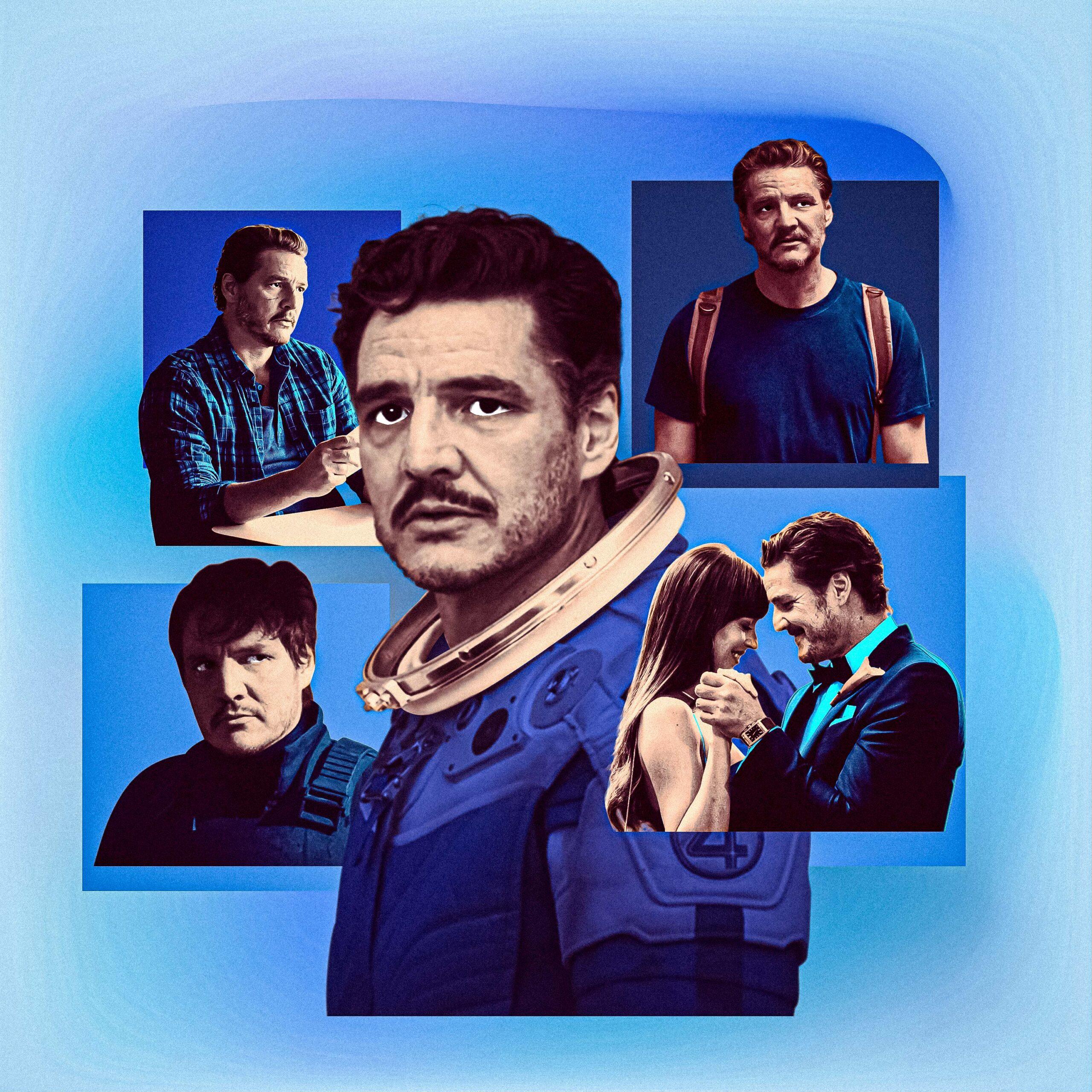
Pedro Pascal is inescapable. He’s in big-budget blockbusters and franchise fare: With this week’s The Fantastic Four: First Steps, he enters the MCU, adding to an IP portfolio that includes appearances in sci-fi/fantasy tentpoles such as Star Wars, Game of Thrones, and the DCEU. He’s in a little-seen anthology movie by former MCU filmmakers (Freaky Tales). He’s in A24-produced, medium-budget originals adjacent to genres whose cultural currency has faded as superheroes have ascended: Eddington (a quasi-Western) and Materialists (a quasi-rom-com). He’s in a prestige TV hit, The Last of Us, which anchored HBO’s Sunday night lineup during the series’ second season. And those are just his credits since April.
Throw in last November’s Gladiator II and last September’s The Wild Robot, and Pascal has played prominent parts in seven movies or TV series released in the past 10 months, which might merit a special Oscar and/or Emmy for whoever handles his schedule. As the headline of Vanity Fair’s July/August cover story proclaimed, “Everyone Wants a Piece of Pedro Pascal.”
At this point, Pascal is less famous for being in any one thing than he is for being in everything. The memes about Pascal’s usage rate are almost as omnipresent as Pascal himself. Like his Fantastic Four character, Reed Richards (a.k.a. Mister Fantastic), Pascal can contort himself to suit any situation. He’s hot, he’s silly, he’s sensitive: He’s a classic “women want to be with him, men want to be him” type. On-screen, he can convincingly kill or be killed; he can rage or cry; he can glower and brood or light up and turn on the charm. In other words, he can act. And although some Pascal fatigue has certainly set in among spectators, even those who think casting directors could stand to cast their nets wider or who doubt Pascal’s suitability for a particular part generally agree that the guy is good.
Thus, the question isn’t so much why he’s in everything as it is how he’s in everything—and whether any other actor has ever appeared in so many leading roles in such a compressed period.
There’s always an “it” actor who’s so hot right now, whenever “now” is. Last year, Glen Powell was everywhere. A decade ago, the actor of the hour was, like Pascal, an international leading man who was poised to complete his Hollywood takeover by joining the MCU: Benedict Cumberbatch. (A 2015 New Yorker cartoon about Cumberbatch’s ubiquity was recently repurposed to feature Pascal.) Our task is to determine how Pascal’s prolific recent run stacks up to previous acting sprees, which we’ll do by drawing on information from The Movie Database, a popular alternative to IMDb that (like IMDb) also contains TV shows.
It’s one thing for a character actor to pop up all over the place: Richard Kind routinely racks up roles at a Pascal-caliber pace. But by Kind’s own admission (when playing himself in a scene in Girls5eva), he’s “not a needle-mover”—he’s a man who aims for “the medium time” and has perfected the practice of constantly working without being famous. When an actor’s career consists mainly of supporting parts in movies or guest spots on TV, they can accumulate credits more quickly than someone whose name appears on posters and marquees.
To filter out “That Guy” types who, as Kind put it, rarely rise “above no. 5 on the call sheet of life,” we restricted our inquiry to actors who were billed no lower than third in a given production on TMDB. We also limited our sample to parts from nondocumentary feature films and TV series. And to exclude ultra-low-profile releases, we set a minimum of 150 TMDB user ratings per production. We extended our search back to 1953; for releases from earlier years, user ratings were too sparse to be reliable. Then we searched for the busiest spans of 10 consecutive calendar months.
With those parameters in place, we found 30 actors who had at least five prominent parts in a 10-month stretch. (Some actors qualified for more than one stretch; in those cases, we’ve displayed only their busiest stretch or, when an actor had multiple equally prolific stretches, their earliest.) Only one actor surpassed Pascal—and under dubious, sad circumstances.
In the late 2010s and early 2020s, action legend Bruce Willis appeared in dozens of forgettable, low-budget, straight-to-video movies, for which he was paid handsomely despite scant screen time and dialogue. Later, when Willis was diagnosed with aphasia, reports revealed the extent of the accommodations many of the moviemakers had made for him, and numerous sources who spoke to the L.A. Times “questioned whether the actor was fully aware of his surroundings on set.” Whether Willis was exploited or knowingly opted to keep performing, this unfortunate final chapter of his career clearly isn’t comparable to Pascal’s current run. Willis did have a separate stretch of six qualifying roles in a 10-month period starting in December 2011, which included some quality films (Lay the Favorite, Catch .44, Looper, The Cold Light of Day, Fire With Fire, Moonrise Kingdom). But Pascal’s seven is the number to beat.
If we filter by box office revenue in addition to user ratings, to exclude straight-to-video releases—using a low bar of $100,000 in today’s dollars, inflation adjusted for past years—we wind up with a subset of the same names, none of whom have more than five qualifying parts. Even with The Last of Us removed from his tally, Pascal places on top with six qualifying productions. Either way, Pascal is unparalleled.
The names on the table above all hail from the past few decades. While that could be partly attributable to a relative lack of user ratings and box office figures for earlier years, we and others have shown that many more movies have been released per year in recent decades than in earlier ones, post-pandemic production slowdown notwithstanding. Consequently, it used to be harder for individual actors to cram in enough prominent roles to appear on a list like this. Of course, prior to the prestige TV era and the streaming boom, it was also less common for movie stars to cross over to TV as Pascal did on The Last of Us. At the very least, we can say with some confidence that Pascal has no recent rivals in terms of pure productivity. And aside from Freaky Tales, the fruits of his labor are far from obscure.
Admittedly, Pascal’s peerless stretch is partly a quirk of the calendar: If The Fantastic Four had come out one week later, for instance, it wouldn’t have fit within the same 10-month window as The Wild Robot. And although Freaky Tales didn’t come out until this April, it premiered at Sundance in January 2024. Shooting for that film commenced in late 2022, which helps explain how Pascal physically found time to star in this closely packed cluster of releases. Still, we’re taking all prior windows of 10 calendar months into account, and no quirks of that kind propelled previous actors (Willis aside) into the Pascal conversation.
In short: Pascal’s screen presence has been as pervasive as it seems. And we’re not even counting some of his side gigs, such as a Spike Jonze–directed AirPods ad and guest spots on “SNL50.” In some respects, Pascal seems even more unavoidable because he’s more interactive and visible than some stars who disappear between press tours. (Alternatively, it’s possible that Pascal is simply always on a press tour.) He’s outspokenly progressive, emotionally vulnerable, relatably bemused by his own ascent to the A list, and—while not completely pandering to his audience’s horniness—at least tolerant of daddy/zaddy-related thirst, all of which tends to play pretty well online. (Which isn’t to suggest that his public persona isn’t also sincere.) As a result, members of the public who don’t seek out his work are still likely to come across him, even though he doesn’t make headlines through romantic drama. All the world’s Pascal’s stage.
Granted, this moment is probably Peak Pascal: After a run like this, it would be hard for his minutes not to decline. He’s not known to be starring in anything for the rest of 2025, and the only upcoming projects on his IMDb page are 2026’s The Mandalorian and Grogu and Avengers: Doomsday and 2027’s Avengers: Secret Wars. More parts will presumably surface: Never bet against Pascal staying busy. But he’s bound to slow down, especially if the salaries he can command as one of the faces (or helmets) of Marvel and Star Wars make it prohibitive for lower-budget productions to keep buying bits of his time.
The makers of Marvel and Star Wars eventually concluded that less is more and dialed down their output. Perhaps Pascal will too, whether it’s to take more time off or to avoid overexposure. But for now, the sun never sets on Pascal’s acting empire. Or, expressed another way, when one of Pascal’s theatrical windows closes, another opens.
That the late-blooming star is in such high demand at age 50 sets this span of Pascal saturation apart from most of the closest comps on the table above, which is fitting for an era of older actors. And to Pascal’s credit, nothing he’s been in lately has been bad. (The last indisputable stinker he lent his talents to was the 2022 quarantine comedy The Bubble.) So all of that quantity hasn’t come at the expense of quality control. Pascal probably has his pick of projects, and though he’s picked plenty of them, he’s tended to have a discerning eye. He may have turned “one for them, one for me” into “two for them, two for me,” but the principle remains: Sometimes he goes big and broad, and sometimes he goes narrow and nuanced, which has yielded a deep, eclectic library of both brand-name hits and original gems such as Prospect and The Unbearable Weight of Massive Talent.
All in all, there are way worse actors for Hollywood to have fallen in love with. And even if you’re sick of the sight of his handsome mug, look on the bright side: The inescapable star is laying the groundwork for some spirited future rounds of Six Degrees of Pedro Pascal.
